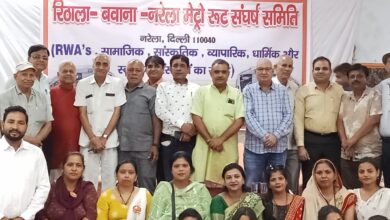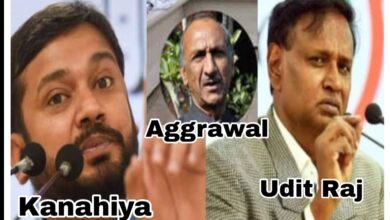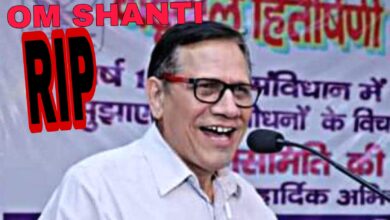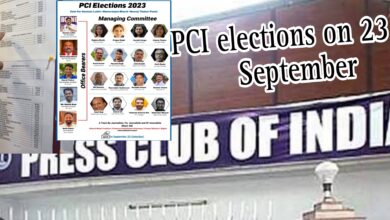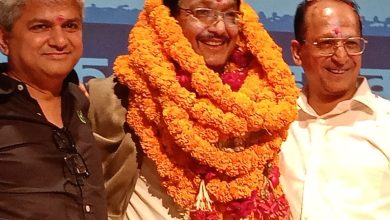Prayas JAC society and India Habitat Centre held a healthy discussion on Social Sector and Role of Media at IHC
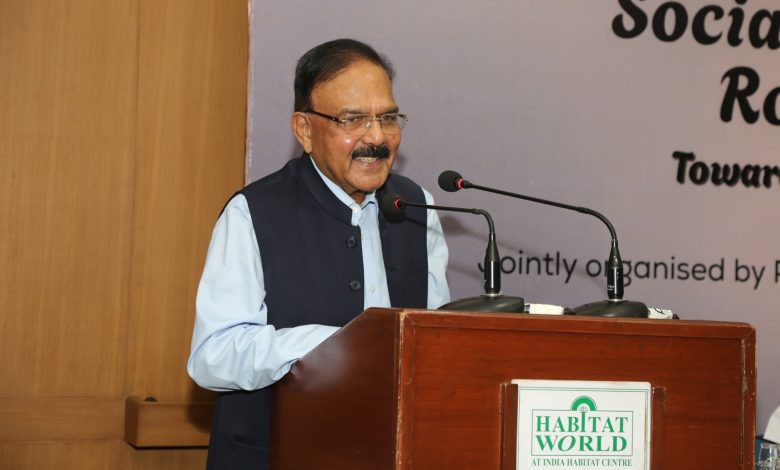
![]()

 KG Suresh[/caption]
KG Suresh[/caption]




ON the joint initiative of Prayas JAC society and India Habitat Centre a healthy discussion was held at IHC with representatives of media, mostly senior journalists, from Academia and civil society organisations actively participating.
The topic of the discussion was SOCIAL SECTOR AND THE ROLE UF MEDIA towards VIKSIT BHARAT -2047.
Ms. Nivedita Pandey delivered the welcome address and set the context for the discussion emphasizing that the two most important pillars supporting the welfare of children are Civil Society and Media. She described them as the “hands and heart” of a child.Ms. Nivedita invited Dr. K. G. Suresh, Director, India Habitat Centre, Mr. Amod K. Kanth, Founder-Mentor, Prayas JAC Society
Mr. Amitabh Srivastava, Senior Journalist
Mr. A. J. Philip, Senior Journalist to the dias with veteran journalist Vinod Kumar joining them later.
In his welcome address Mr. Amod K. Kanth, Founder-Mentor, Prayas JAC Society thanked Dr. K. G. Suresh and IHC for facilitating the collaboration with Prayas and initiating this healthy discussion.
He mentioned that the first program at IHC was held on the issue of homelessness, and today’s session focuses on the social sector and role of the media, the important fourth pillar. He elaborated that in both government and non-government parlance, the ‘social sector’ encompasses all matters concerning society at large — children, women, and the elderly.
Providing a brief background of PRAYAS, which began as a partnership among Delhi Police, Delhi School of Social Work, and Shramik Vidyapeeth (now JSS under the Ministry of Skill Development)Mr. Kanth said that it’s today operating through 317 centers with 789 dedicated co-workers.
Drawing on his experience as a police officer, he stated that policing should focus on serving the marginalized.
He highlighted the “Fifth Pillar” of democracy — the social sector — alongside the legislature, executive, judiciary, and media.
With 3.7 million voluntary organizations operating in India, he emphasized their vital contribution in the social sector.
Mr.Amod Kanth reflected on India’s progress toward Sustainable Development Goals (SDGs) — 17 goals and 54 targets — noting that a large proportion of India’s population still lives below the poverty line, with many children lacking access to education and schools.
Dr. K. G. Suresh, Director, India Habitat Centre, veteran journalist Dr. Suresh warmly welcomed all participants to IHC and expressed appreciation for the long-standing relationships among those present.
Recalling his experience as a crime reporter, he noted that Mr. Kanth was one of the most accessible and most cooperative officers during the Jessica Lal case murder case and other social issues.
He described IHC’s initiatives, including collaborations with the National Stock Exchange for financial literacy and with ICPR for Indian philosophy study circles.
The partnership with Prayas, he said, aligns with IHC’s vision of promoting inclusivity and sustainable development.
Dr. Suresh pointed out that while India has made significant strides, media coverage of the social sector has declined, partly due to corporate influence and a lack of specialized training for journalists.
He emphasized the need for better orientation and collaboration between media and NGOs, citing issues such as misreporting, lack of awareness, and poor public perception of NGOs.
He also raised the question of whether editors and media managers need greater sensitization to social issues.
He called for a comprehensive discussion on improving awareness, identifying gaps, and strengthening media coverage of the social sector, including community radio and alternative media.
Mr. Amitabh Srivastava, Senior Journalist associated with Prayas shared his experiences of working across political, entertainment, and lifestyle journalism before engaging with Prayas, where he became aware of ground realities — such as child marriages and crisis interventions during cases like Nirbhaya and obnoxious rapes taking place in the society due to lack of women safeguards.
He criticized both NGOs and media institutions for insufficient efforts — NGOs often lack media budgets, while journalism schools neglect training on social sector reporting.
He also highlighted how the media demonizes children in conflict with law, focusing on a small fraction while ignoring the majority of children in need.
Mr. Alok Mehta, Senior Journalist
observed that Delhi does not represent all of India — regional newspapers in states like Kerala and West Bengal do significant work but remain underrepresented.
He emphasized that stories of local NGOs and small social initiatives rarely receive attention.
He cited examples from Nepal, where small newspapers effectively cover NGO work.
He urged that positive grassroots stories — about education, sanitation, and community leadership — must be shared widely.
Amitabh Srivastva also recommended that NGO success stories be circulated to libraries and community networks to enhance public awareness.
Mr. A. J. Philip, Senior Journalist
praised Mr. Kanth’s work with Prayas, noting that it rarely received due media coverage. He shared examples from Haryana, where long-term educational efforts went unnoticed, while minor negative incidents gained headlines.
He pointed that as per reports, 85% of NGO funding goes towards its infrastructure and salary, leaving only 15% of funds towards actual work. This needs to be re-worked and managed.
He validly pointed out that media prioritizes bad news over good work and suggested that NGOs maintain financial discipline, ensuring that a majority of funds are used for programs rather than administrative costs.
In an open discussion Mr. Pradeep Mathur stressed the communication gap between media and NGOs and proposed organizing a seminar to develop skills for “selling development stories” effectively. He urged for a seminar and a longer session to discuss this important subject.
Mr. Sandeep Marwah suggested practical steps for media outreach, citing initiatives such as Radio Noida 107.4, Radio Raipur 88.4 and MSTV Community Television (now OTT), offering NGOs platforms for promotion.
He invited all NGOs to join hands with him in covering and publishing great life changing stories.
Mr. Sudhanshu Ranjan discussed challenges of access to media networks, the impact of political influence, and the need to make social issues appealing for public engagement.
Mrs. Sangeeta emphasized that not all NGOs can work in every field, urging collaboration among social organizations. She highlighted Akashvani’s (radio) role in promoting positive news about social initiatives. She also cited the example of Mr. Jadev Payeng from Assam who turned barren land in Assam into lush green forests and how because of media coverage he was awarded the prestigious Padma Shri Award.
Ms. Sreeta Panekar, Founder of Butterfly, congratulated IHC and Prayas for the collaboration and stressed the need to change narratives by partnering with genuine grassroots NGOs.
Mr. Avinash (Hindustan Times) encouraged NGOs to utilize digital platforms such as YouTube and social media to increase visibility and generate revenue through online engagement.
Mr. Jayanta Ghosal (NDTV) explained that many media houses avoid NGO stories due to credibility concerns and lack of distinction between genuine and questionable organizations.
He suggested recognizing and promoting credible, state-recognized NGOs.
Mr. Arvind Singh, senior journalist highlighted the need for renewed collaboration between journalists and social sector workers, recalling the effectiveness of earlier grassroots communication through letters and local reporting.
He recalls how his story about a small farmer whose house was burnt resulted in receiving compensation from the government because of media coverage.
He praised Mr. Kanth for his genuine concerns about the marginalized and the kind of support he gave to the needy as a policeman. He appreciates and acknowledges Mr. Kanth’s role in getting him connected to the social sector.
Ms. Niharika (Hype by Niharika, YouTuber) emphasized the importance of digital amplification. She noted that consistent social media activity — such as daily posts — can substantially enhance visibility, impact and even revenue generation for NGOs.
Mr. Narayana (German Television) shared an international perspective, stating that while good NGO stories exist, they often lack compelling storytelling. He urged NGOs to learn the art of narrative-building.
Mr. Dinesh Karma discussed the challenge of information overload and the need for effective dissemination strategies to ensure social sector stories capture public attention.
Mr. Rehmatullah remarked that “God helps those who help themselves,” adding that consistent, large-scale good work will inevitably attract media attention, though financial constraints remain a reality.
In his concluding remarks, Mr. Amod K. Kanth thanked all participants for their valuable contributions. He reiterated that by 2047, as India envisions becoming Viksit Bharat, both media and voluntary organizations — numbering around 3.7 million — will play an indispensable role in achieving inclusive growth.
He emphasized the importance of mainstreaming the social sector, enhancing coverage, and addressing shortcomings in visibility and recognition. He cited the Darpan Portal, which has 1.5 lakh registered voluntary organizations, as an example of the sector’s scale and potential.
He stated that the Government cannot grow without the social sector. He concluded by reaffirming that India’s progress toward sustainable development and equality is not possible without an empowered and recognized social sector working hand in hand with the media.
The discussion concluded with a Vote of Thanks to All Participants.



